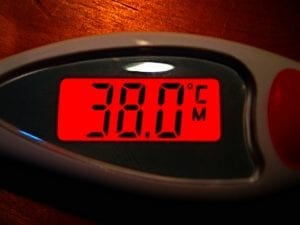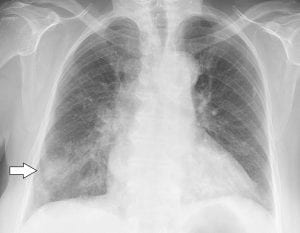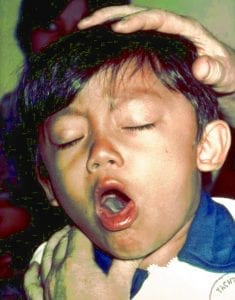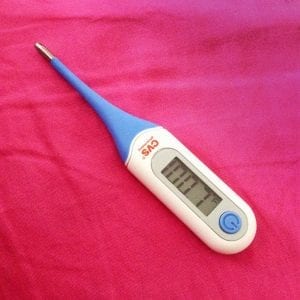Hear wheezing, barking, or hacking in your baby’s cough? Find out if it is normal or if it could be a sign of something serious, and know the best cough medicine for kids.

Your baby’s cough can have a lot of implications, so it’s difficult to know what’s wrong. That’s why it’s better to ask or consult with your doctor first about your baby’s cough than just guessing with the what if’s.
Coughs are actually what the body does to protect itself. It helps in clearing the airway by getting rid of the phlegm in the throat and postnasal drip. It’s the mucus that you can sometimes feel dripping down to your throat or feeling like food stuck in the throat. Anyway, there are two kinds of coughs:
A dry cough: This kind of cough appears together with colds or allergies to help with clearing the postnasal drip or the irritation.
Wet cough: This is what causes phlegm or mucus to appear and form in the airways. It can be a bacterial infection or a respiratory illness.
Coughs don’t usually appear in babies younger than four months unless it’s severe. If a baby that young is experiencing cough symptoms, it could be due to a dangerous infection called respiratory syncytial virus (RSV). By the time your baby is one year old, coughs aren’t something for you to genuinely worry about.
Make sure to get remedies for your baby to help him breathe easier during this time (more helpful tips available here: HealthLine.com).
Common Cold Or Flu
Your baby may have a cold if he has a:
- Runny or stuffy nose
- A sore throat
Sounds like: Dry hack
Other symptoms: If the coughs are dry, your baby may have

- Some rattling mucus
- Slight fever
Treatment: Give your baby lots of fluids and make sure to have let him take adequate rest. Don’t give him strong medicines to treat a cough because it usually doesn’t work. Use natural methods instead of honey and saline drops.
You can use Acetaminophen if your kid has a fever. Call the doctor if the temperature is over 100.4 degrees or if your baby is four months or younger.
Croup
Your baby may have croup if he wakes up in the middle of the night, finding it difficult to breathe and, at the same time, with a loud, barking cough.
Sounds like: A barking cough
Other symptoms: Your child can have this due to a viral infection, which makes the lining of the trachea swell. The swelling closes the airways and, thus, is the reason for the difficulty in breathing.
Treatment: Make sure your child is calm and then do the following:
- Let your child breathe in the steamy air by running the shower and closing the door.
- Take him outside to breathe in the damp air.
- Use air from a cool-mist humidifier.
If your baby still has croup after three to four days, go to the doctor.
Pneumonia

Pneumonia is caused by a lot of factors like a cold.
Sounds like: Wet and phlegmy
Other symptoms: Fatigue with a cough in shades of green and yellow.
Treatment: It depends. If the pneumonia is viral or bacterial, consult with your doctor to be sure. Bacterial pneumonia is dangerous, though.
Bronchiolitis Or Asthma
These two illnesses appear after getting a basic cold along with a cough and runny nose. A lot of factors like dust can usually cause wheezing.

Children 2 years old and younger don’t usually get asthma unless it’s in the family or if the baby has eczema. If it’s not asthma, the tightening of the airways is called Reactive Airway Disease.
Children younger than one-year-old and with bronchiolitis tend to have a respiratory syncytial virus (RSV), a dangerous and life-threatening virus that infants can get.
Sounds like: A cough with wheezing or noisy breathing
Other symptoms: It’s difficult to differentiate a cough between bronchiolitis and asthma.
Your baby may experience these symptoms in asthma:
- Cold symptoms
- Itchy and runny eyes
Bronchiolitis in the fall and winter is usually accompanied by:
- Slight fever
- Appetite loss
Your child may also experience sucking in and out of the chest and diaphragm if he has asthma.
In the case of asthma, your baby will be suffering retractions.
Treatment: Monitor their respiratory rate and if it becomes 50 breaths per minute or higher, call the doctor or 911
To be safe, call your doctor if your child is experiencing wheezing. What your doctor would do is to use medication meant for asthma to treat wheezing. The drug that might be recommended is albuterol so that your baby can breathe better by opening the airways. If asthma becomes severe, you might have to use a nebulizer with albuterol.
Once the breathing has stabilized, give the baby lots of fluids and rest, and use the best humidifier for baby from now on. If the cough worsens after 24-48 hours, call the doctor.
A Whooping Cough
In the past, this illness was one of the leading causes of death in infants until a vaccine for this infection was created. However, there have been outbreaks with this illness recently, but most of the time, colds or fevers aren’t part of the symptoms.

Sounds like: A loud, rapid whoop
Other symptoms: Frequent, coughing spasms along with:
- Bulging eyes
- Tongue sticking out
- Face discoloration
Treatment: Prevent the disease by giving your baby a vaccine. Since babies need three doses of vaccine before he is immunized for whooping cough, vaccinate your caregivers too.
Whooping cough warrants an immediate call to 911 as it is dangerous. Your baby may need to be hospitalized to breathe oxygen properly whenever he is coughing.
Antibiotics also help in treating this disease. Your baby may need several months before he is fully recovered.
Foreign Object
Foods can also cause choking, and your baby may be coughing as an effort to take it out. Always monitor your baby to see what he is putting inside their mouth.
Sounds like: Small, continuous coughing
Other symptoms: If your baby doesn’t have any other symptoms other than persistent coughing for days, there might be something stuck in their windpipe. In worse cases, the baby may catch pneumonia because he swallowed the food or object improperly.
Here are some symptoms of an object or food being stuck in the windpipe

- obvious distress
- being silent
- Turning pale or blue
Treatment: If you think something is blocking the throat, turn the baby over and hit him between the shoulder blades five times to dislodge the object. If it doesn’t work, call 911.
You can help a baby cough up the foreign object by:
- Tilting the head down
- Pat the back gently
If you think that the object is still stuck, get a chest x-ray. The doctor will then recommend you visit another doctor who can do a bronchoscopy. During this, the doctor will use general anesthesia and fiber-optic with tweezers and insert it down the passageway to remove the object.
When To Call For Help
The following warrants a call to the doctor:

- Younger than four months but coughing
- A dry cough with a cold that is for more than five to seven days
- Dry or wet cough with colds and fever over 100 degrees
- Mild, light wheezing
- Coughing fits
Call 911 when the baby does the following:
- Rapid wheezing
- Grunting
- Difficulty catching breath
- Turning blue
- Fast retracting and expanding of the stomach
Know when to call your pediatrician or not, hoping that the information above has educated you somehow on the baby cough.
FAQs
When should you worry about a baby cough?
You should worry about a baby cough when the infant is younger than four months old and makes wheezing noises. Dry coughing that lasts up to seven days should concern you as well.
Is it normal for babies to cough?
Yes, it is typical for babies to cough. The reason is that their airways can get irritated quickly by dust or saliva.
What can I do for my 6-month-old’s cough?
You can treat a baby cough at six months by giving them breast or formula milk. You may also try applesauce, yogurt, pudding, and chicken broth.
How can I help my seven months old with a cough?
You can easy your 7-month-old’s coughing by giving them warm fluids like water or apple juice. Do it up to four times every day until they are no longer coughing.
Can teething cause a cough?
Yes, teething can sometimes cause coughing. However, if it does not stop after a few days, you should consult a doctor.
How long should baby cough last?
A baby’s cough should only last for several days. If it persists for weeks, they may have a chronic illness.
How can I cure my baby’s cough naturally?
You can cure a baby’s cough naturally by giving them either super cold or warm liquids. Be sure that they drink as much water as possible to thin out their mucus as well.
Why do babies cough while feeding?
Babies cough while feeding because the milk has possibly gone through their lungs while aspirating. In that case, you need to stop feeding them and wait until the milk comes out.
Last Updated on May 15, 2023 by Mary Cimeni
DISCLAIMER (IMPORTANT): This information (including all text, images, audio, or other formats on FamilyHype.com) is not intended to be a substitute for informed professional advice, diagnosis, endorsement or treatment. You should not take any action or avoid taking action without consulting a qualified professional. Always seek the advice of your physician or other qualified health provider with any questions about medical conditions. Do not disregard professional medical advice or delay seeking advice or treatment because of something you have read here a FamilyHype.com.